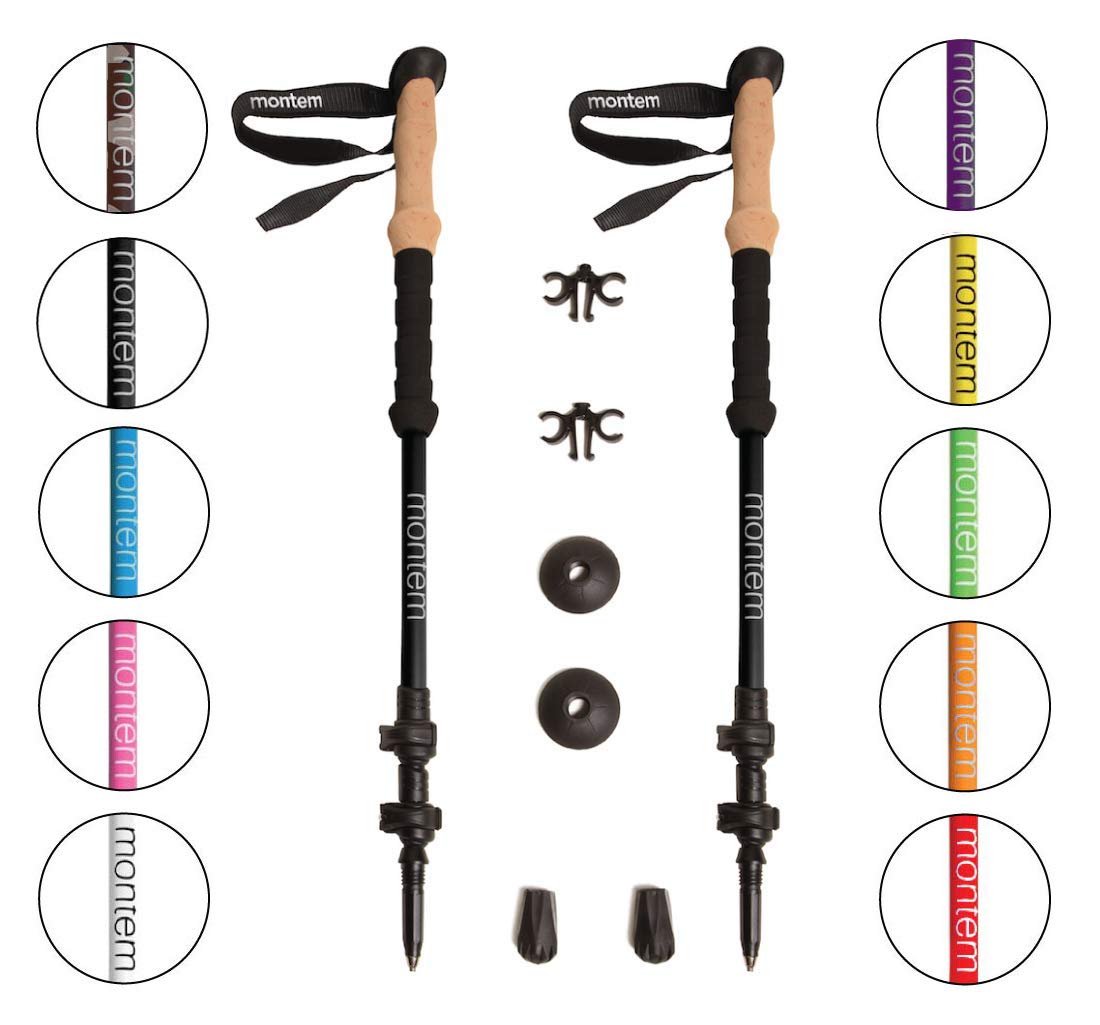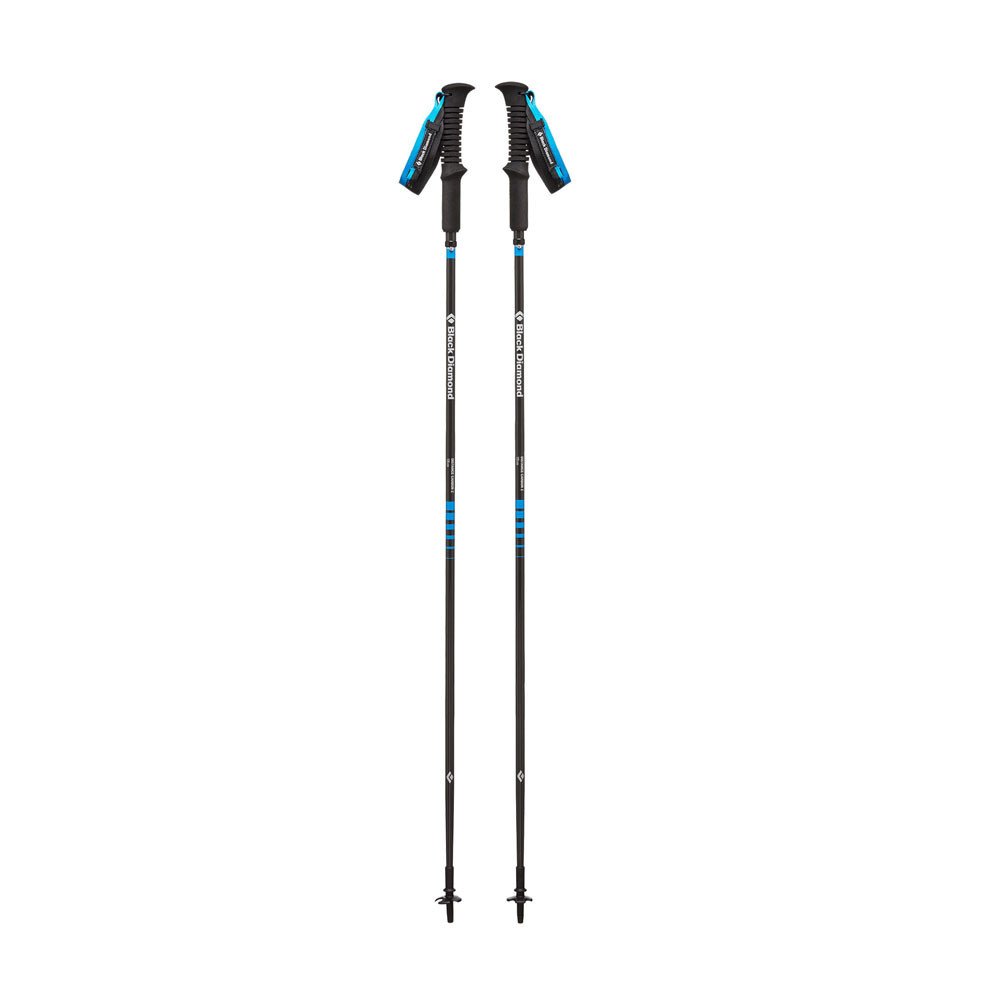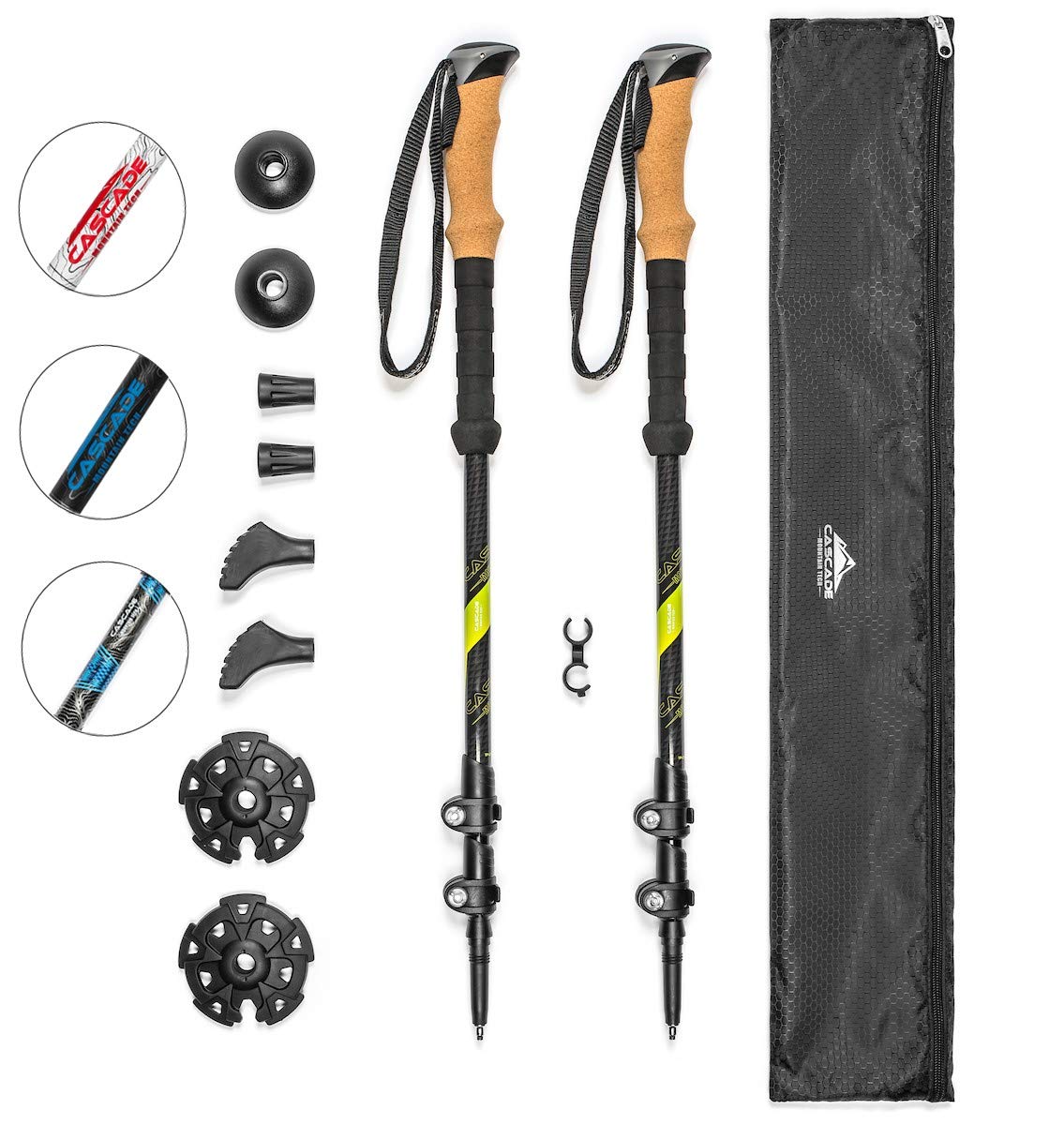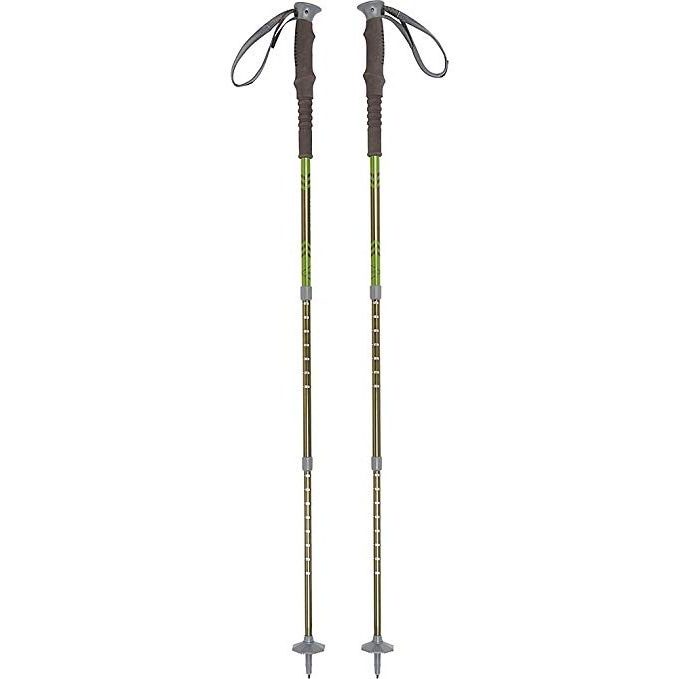Trekking poles (also referred to as hiking poles, hiking sticks, or walking poles) are a typical hiking accessory that is used to assist walkers with their rhythm and supply stability on a rough parcel of land.
The best trekking poles cut back joint impact, particularly on your knees. Using trekking poles encourages a far better hand and arm position for long hikes similarly, improved circulation in your hands.
Whether you are recovering from an injury or hoping to increase your hiking stamina, a good pair of hiking poles will enhance your adventures and make them more enjoyable. Take a read of the benefits of trekking poles for hikers for a more thorough understanding of whether they are for you or not.
Table Of Contents
Top 10 Best Trekking Poles in 2021
1. Black Diamond Trail Ergo Cork Trekking Poles
The carbon fiber and folding designs that get all the attention in the trekking pole market are impressive innovations, but for hikers that just want a pair of trustworthy sticks at a decent value, we have a tendency to advocate the black diamond trail, Ergo Cork.
At $130, they’re a solid value and come with very few compromises. In fact, the all-aluminum construction is only an ounce heavier than the premium Leki Micro Vario below but is still plenty sturdy for most dirt, rock, and snow travel.
The trail additionally has Black Diamond’s comfy, ergonomically shaped cork grips and reliable FlickLock length adjusters.
What are the downsides of the Trail Ergo?
For travelers, climbers, or those that prioritize collapsibility, the 27-inch minimum length may be an issue. It shouldn’t get in the way when strapped to the outside of a pack, but it is a couple of inches longer than many other 3-section designs (and it can’t come close to a true collapsible pole).
As downsides go, that’s pretty insignificant for most folks, and the Trail Ergo Cork’s stand out as our favorite all-around trekking pole.
Pros
- Ergonomic, natural Cork Grips
- Interchangeable carbide tips
- Solid construction
- Good price
Cons
- Relatively Heavy
- Have long collapsed length
2. Leki Micro Vario Carbon Trekking Poles
Leki’s Micro Vario Carbon poles are a no-compromise option for the lightweight crowd. Weighing just over 1 pound for the pair, they manage to squeeze a full set of high-quality features into their compact and foldable construction.
Unlike many competitors, you get nearly 8 inches of adjustment with a Leki’s SpeedLock 2 system, and we’ve found the poles to be among the most user-friendly for both folding down and setting up (we can do both without having to take a break while hiking).
On the trail, the Micro Vario’s weight savings is noticeable, particularly over a long day. You do sacrifice a little in terms of durability, but the carbon shafts have been sturdy enough for crossing glaciers, leaning on during steep descents, and as the structure of a trekking pole supported the shelter.
We do prefer cork grips to foam, but these are the nicest and most comfortable foam grips we’ve used, and the choke-up extensions are great for extended climbs.
Leki also offers the Micro Vario Carbon in an even pricier $230 AS version, which includes a low-profile shock system for added trail comfort.
Pros
- Lightweight
- Easy to fold and unfold
- Have a packable design
- Includes travel bag
Cons
- Very Expensive
3. Montem Ultra Strong
Montem is a relatively young outdoor gear company based in New York City but is rapidly making waves in the trekking pole market due to the surprisingly low prices.
Their leading model is the Ultra Strong, which has an aluminum build, lever locks, and comfortable foam grips. At 19.2 ounces, the poles are a little heavier than the premium options above but should be plenty light for most day hikers and backpackers.
Further, the poles have a short 24-inch minimum length, which is great for travel. However, what sets the Ultra Strong apart is the price: at only $60, they compete with poles that cost twice as much from Black Diamond, Leki, and REI.
What do you sacrifice at this price? Sturdiness, for one. We took the Ultra Strong poles on a remarkably steep hike on Vancouver Island and were surprised by the level of vibration and worrisome clicking throughout the descent. For heavy use and difficult terrain, these poles pale in comparison to the build of a more rugged model like the aluminum REI Traverse.
Montem did, however, nail important details like choke-up extensions on the grips, in-field adjustments for the locking mechanism, and easily adjustable straps. At just $60, they’re fine for light use and easy to moderate day hikes, but we didn’t find them confidence-inspiring enough for tough terrain.
Pros
- Great Price range
- Adjustable quick locks
- Lightweight
- Great for casual usage
Cons
- Material is not so tough
- Not for long-term durability
4. Black Diamond Trail Back
As a market leader, black diamond features a fairly in-depth trekking pole line-up. A consistent favorite is their budget-oriented Trail Back, which in many ways is a trimmed-down version of the Trail Ergo Cork above.
You lose the ergonomic shape and cork grips, but the two trusty FlickLocks remain, as well as the sturdy aluminum construction.
Further, among the options at under $100, the Trail Back’s have a longer track record of durability than the Montem above (but do cost $30 more).
What are you forgoing with a mid-range pole just like the trail Back? To start, they are rather heavy at 20 ounces for the pair and therefore not a top choice for long-distance backpackers or thru-hikers. Also, the rubber grips are a definite step down in comfort from foam or cork, which do a better job absorbing sweat and preventing chafing while on the trail.
But the Trail Back’s strong, no-nonsense construction makes a lot of sense for those looking to keep cost in check while not sacrificing much in terms of quality.
Pros
- Tough material
- Good all-around features
- Non-slip grip extension
Cons
- Rubber grips are not comfortable
- Snow baskets are not included
5. Black Diamond Distance Carbon Z
The Distance Carbon Z is Black Diamond’s lightest weight Z-Pole model and is ideal for fast and light pursuits. When released, Z-Pole technology was a major innovation to the trekking pole market, and it remains impressive in its current form.
A sleeve on the top section moves down from the grip, cones on the ends of each of the connected sections ensure they each fit together, and a small button pops into place to secure everything. From compact to deployed is a two-second affair.
All four fixed-length sizes of the Carbon Z weigh in the ballpark of 10 ounces per pair, making them so light that they’ve even become popular with long-distance trail runners. Just over a foot long when compacted, they easily fit into a daypack or duffel for travel.
Keep in mind that the poles are reasonably stiff overall but not quite durable enough to handle the rigors of extended alpine use or snow travel—Black Diamond also offers more substantial choices for backpacking, just like the slightly heavier Alpine Carbon Z. And if you prefer a little adjustability, check out the $190 Distance Carbon FLZ, which includes a single Flick Lock at a pretty minimal weight penalty.
Pros
- Lightweight
- Small fold area
- Aluminum ring to protect the carbon fiber
Cons
- Not designed for heavy usage and rough ground
6. Leki Micro Vario Ti Cor-Tec
With a folding-style design, Leki’s well-loved and ergonomic cork grips, and a competitive price of $140, the Micro Vario Ti Cor-Tec is one of our favorite poles in this category. This aluminum model folds down to a mere 15.5 inches, which is among the smallest on our list.
And we love Leki’s SpeedLock 2 locking system—it can be tightened with a small dial, no extra tools are needed. The ability to easily keep the locks tight adds to the already durable nature of these poles.
As expected, there are tradeoffs to this design. As with other folding trekking poles, the Micro Vario Ti Cor-Tec is compact, but it’s quite heavy at over 20 ounces for the pair (the sacrifice of the more affordable price tag and alloy build).
Additionally, folding poles, in general, are less sturdy than their telescoping counterparts, making these some of the least weight-bearing aluminum poles on this list. That said, they’ll surely take a beating better than the carbon fiber Leki Micro Vario Carbon and the BD Distance Carbon Z above.
Pros
- It can collapse to only 15.5 inches
- Design is 25% lighter and 20% stronger
Cons
- Rubber tips must be purchased separately
- Relatively heavy when folded
7. Mountainsmith Halite
The folding Halite from Mountainsmith is a less expensive alternative to poles such as the Leki Micro Vario and BD Distance Carbon Z. You’ll notice a big jump in weight with the aluminum and more cost-friendly construction, but these poles still collapse down to a competitively small size, perfect for sticking inside your carry-on luggage or daypack.
And with cork handles and hiking baskets, snow baskets, and rubber tips enclosed, they are of a decent price at simply $80.
The Mountainsmith Halite is a nice choice if you need the compact folded size, but there are sturdier, higher-quality options for the price. We do like the cork grips and padded wrist straps on the Halite, though they don’t hold a candle to Leki’s ergonomic cork grips.
The simpler folding mechanism, which uses a vinyl coating compared with the Kevlar on Black Diamond’s Z-Poles, isn’t as sturdy or reliable for extended use. But the Halite excels for travel and light day hiking. If you don’t require the compact folding design of the Halite, Mountainsmith’s Tellurite is a nice telescoping alternative for $15 less.
Pros
- Collapsible pole for a decent price
- Vinyl coated cable connectors
- Snow baskets included
- Collapses to only 16 inches
Cons
- Material is not sturdy
- Durability is not so good
8. Leki Makalu Lite Cor-Tec AS
Leki has built a reputation around its super comfortable cork grips and their ergonomic shape. With a slight forward tilt, they have a very natural feel in the hands, and the build quality of the grips is second to none.
Their 2019 Makalu Lite carries on this tradition while including modern features like a low-profile shock absorption system and minimalist strap design. You miss out on Leki’s top-end SpeedLock 2 at this value period, however their simplified SpeedLock plus remains a solid partner.
Expect consistent strongholds, and, as an added bonus, you can adjust the locking mechanism without a screwdriver.
Priced over $100, you’re getting on the spendy side with the Makalu Lite to still have an aluminum shaft. It is the cost of high-end componentry, however, and the quality 7075-series alloy helps keep weight in check at 17.4 ounces for the pair.
In the end, their relatively high price does bump them down a few spots but they remain a solid choice if you want shock absorption with few compromises.
Pros
- Shock absorption system
- Quality grips made from cork
- Next-generation SpeedLock plus
Cons
- What you get for the amount you spend is not worthy
9. Cascade Mountain Tech Carbon Fiber Quick Lock
Carbon fiber typically is associated with high-end builds and premium prices, but Cascade Mountain Tech offers a pair of carbon poles for under $50. On paper, the poles stack up really well with a 16-ounce weight, simple lever locks, and foam grip extensions.
Impressively, Cascade Mountain Tech didn’t skimp on accessories either, with rubber tips and 2 sets of baskets for mud and snow. The Carbon Fiber poles are available with either a foam or cork grip and while we typically prefer cork, we lean towards foam in this case as a cheap cork grip will break down over time.
The main downside in choosing the Cascade Mountain Tech poles is durability. The carbon shaft does a great job keeping the weight low but is more likely to get a crack or snap under a load than another budget pole like the aluminum Montem above.
Moreover, the overall construction is rather cheap and the cost-cutting in the plastic adjustment system doesn’t inspire confidence in its longevity. But if you take good care, going with Cascade Mountain Tech gets you a pair of lightweight poles for about 1/3 of what you’d pay for carbon from a company like Black Diamond.
Pros
- Cheap Price
- Lightweight
- Comfortable grip
- Quick-Lock
Cons
- Not built to last
10. Kelty Upslope 2.0
The most important thing to know about the Kelty Upslope 2.0 is its price: $40 for a pair of decent aluminum trekking poles is an absolute steal. Kelty even includes rubber tips for pavement walking and extended foam grips should you need to choke up for uphill travel. For the casual user or someone interested in trying out trekking poles for the first time, the Upslope 2.0 is a fine option.
What are you giving up for the Upslope’s discounted price? The main compromise is the locking mechanism. In contrast to the strong lever locking systems above—even the $60 Montem’s is an upgrade—the Upslope uses a twist lock.
For easy trails, these should provide sufficient holding power, but under a lot of strain and over time, they are more likely to start slipping. Part of the reason is user error: it is relatively easy to overtighten or loosen the locking pieces to a point where they start to fail. But there’s a reason lever lock systems dominate the market in 2020.
Pros
- Simple design
- Cheap
- Non-slip carbide tip
- A protective cap is included
Cons
- Cheap locking mechanism
- Not as comfortable as other options
Continue Reading: Best Ski Goggles in 2020











